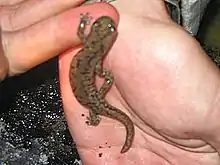Hydromantes
Hydromantes, commonly referred to as web-toed salamanders, is a genus of the lungless salamander family, Plethodontidae; they achieve respiration through their skin and the tissues lining their mouth. They are endemic to northern California, United States.[1] Salamanders of this genus are distinguished in having extremely long tongues that they can project to 80% of their body length.[2] Similar species endemic to southern France and Italy are now classified in a distinct genus, Speleomantes.
| Web-toed salamanders | |
|---|---|
 | |
| Hydromantes platycephalus | |
| Scientific classification | |
| Kingdom: | Animalia |
| Phylum: | Chordata |
| Class: | Amphibia |
| Order: | Urodela |
| Family: | Plethodontidae |
| Subfamily: | Plethodontinae |
| Genus: | Hydromantes Gistel, 1848 |
| Species | |
|
5, See table. | |
Species
The following five species are placed in this genus:
| Binomial Name and Author | Common Name |
|---|---|
| Hydromantes brunus Gorman, 1954 | Limestone salamander |
| Hydromantes platycephalus (Camp, 1916) | Mount Lyell salamander |
| Hydromantes samweli Bingham, Papenfuss, Lindstrand, and Wake, 2018 | Samwel Shasta salamander |
| Hydromantes shastae Gorman & Camp, 1953 | Shasta salamander |
| Hydromantes wintu Bingham, Papenfuss, Lindstrand, and Wake, 2018 | Wintu Shasta salamander |
References
- Hydromantes brunus : Limestone Salamander
- Deban, S. M.; O'Reilly, J. C.; Dicke, U.; Van Leeuwen, J. L. (2007). "Extremely high-power tongue projection in plethodontid salamanders". Journal of Experimental Biology. 210 (4): 655. doi:10.1242/jeb.02664. PMID 17267651.
External links
- Frost, Darrel R. 2007. Amphibian Species of the World: an Online Reference. Version 5.2 (15 July 2008). Hydromantes. Electronic Database accessible at https://web.archive.org/web/20071024033938/http://research.amnh.org/herpetology/amphibia/index.php. American Museum of Natural History, New York, USA. (Accessed: August 1, 2008).
- AmphibiaWeb: Information on amphibian biology and conservation. [web application]. 2008. Berkeley, California: Hydromantes. AmphibiaWeb, available at http://amphibiaweb.org/. (Accessed: August 1, 2008).
This article is issued from Wikipedia. The text is licensed under Creative Commons - Attribution - Sharealike. Additional terms may apply for the media files.